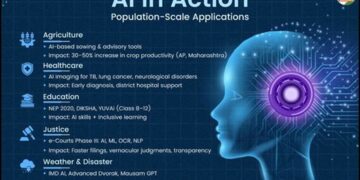By: Dr. Reyaz Ahmad
In India, career choices are often restricted to two main fields—Medicine (MBBS) and Engineering. This trend is deeply rooted in the nation’s socio-cultural fabric and has been perpetuated over decades, making these professions synonymous with success and stability. While there are numerous opportunities available in other sectors, MBBS and Engineering remain the top choices for students and parents alike. In this article, we delve into the various reasons why these two careers dominate the Indian landscape and overshadow other fields.
- Lack of Proper Recognition for Other Careers
The lack of proper recognition for alternative career paths is one of the foremost reasons why MBBS and Engineering are perceived as the only viable options. Careers in arts, humanities, sports, design, and vocational trades often struggle for legitimacy in the eyes of society. Many still hold on to the belief that fields like journalism, social sciences, and creative arts are less rewarding, both financially and in terms of social prestige.
As a result, students who might excel in these fields are coerced into pursuing medicine or engineering to meet societal expectations. This mindset limits the potential for talent in these underrepresented areas, leading to a lack of diversity in the professional landscape and a reduced acknowledgment of achievements outside STEM.
- Parental Obsession and Societal Pressure
One of the significant cultural phenomena in India is the pressure parents put on their children to succeed. This pressure is often driven by societal comparisons, commonly referred to as “sneaking to others’ windows.” Parents frequently compare their children’s academic and career choices with those of their peers. If the neighbor’s child becomes a doctor or an engineer, it becomes the benchmark for success, pushing other parents to nudge their children into the same fields, regardless of their interests or aptitudes.
This competitive mindset forces students into a race that they may not be equipped for or interested in, which leads to dissatisfaction and potential mental health issues. The emphasis on fitting into societal molds overlooks the individuality of each child, stifling personal growth and development.
- Stereotypes and Myths about Worthy Professions
In India, a long-standing stereotype is that only doctors and engineers lead lives worth aspiring to. These professions are associated with job security, high income, and social prestige, while others are viewed as lacking stability or societal value. The myth that being a doctor or an engineer is the only “respectable” way to secure a future continues to influence career decisions.
This stereotype is often reinforced by anecdotal success stories within families and communities, where children in these fields are celebrated, while those pursuing unconventional careers are met with skepticism or pity. The bias is so deeply entrenched that even careers that require significant intellectual or creative prowess, like research, law, or entrepreneurship, are considered secondary.
- Unrealistic Parental Expectations and Social Status
Parents’ expectations in India are often unrealistically high. They envision their children not only succeeding in academics but also achieving success in careers that promise wealth, status, and a high social standing. Medicine and engineering, being seen as the most “noble” and “intelligent” professions, fulfill these criteria. The social status that comes with saying “My child is a doctor/engineer” is seen as a badge of honor in many families.
This mindset puts enormous pressure on students to conform to these expectations, often at the expense of their happiness and personal fulfillment. The lack of open dialogue between parents and children on career choices further exacerbates this issue, leaving many young individuals feeling trapped in fields they do not enjoy.
- Lack of Awareness and Exposure to Alternative Careers
The Indian education system and society, in general, offer limited exposure to alternative career paths. While students are made aware of the medical and engineering fields from an early age, other options like digital marketing, culinary arts, psychology, and sports management are rarely discussed. This lack of awareness is compounded by the absence of structured career counseling in most schools, leaving students ill-equipped to make informed choices.
Moreover, parents who themselves lack knowledge about emerging fields often view them with skepticism, preferring their children to pursue conventional career paths. Consequently, students tend to gravitate toward MBBS and Engineering simply because they lack awareness or understanding of the potential in other domains.
- The Education System’s Emphasis on STEM Fields
The Indian education system’s emphasis on Science, Technology, Engineering, and Mathematics (STEM) subjects from the secondary school level onwards steers students toward engineering and medical fields. The glorification of excelling in subjects like mathematics and science creates a bias where students pursuing arts or humanities are often deemed less intelligent or ambitious.
Additionally, the existence of national-level competitive entrance exams like NEET for medicine and JEE for engineering reinforces the importance of these fields. These exams receive extensive media coverage, and the results are celebrated nationally, making them seem like the only gateways to success. The lack of similar recognition or structured pathways for careers in arts, social sciences, or vocational training makes it difficult for students to view them as legitimate options.
- Limited Career Guidance and Counseling
Career counseling is still a nascent concept in India, and most students do not receive professional guidance on choosing career paths based on their strengths, interests, and market demand. In the absence of expert advice, students rely on parental guidance and societal norms, which are skewed in favor of medicine and engineering.
This lack of career counseling means that students are often unaware of their own potential in fields outside STEM and end up pursuing the “safe” and “respected” options that their parents or society suggest. More structured career guidance could help break this cycle, allowing students to explore diverse professions that align better with their aspirations.
- Economic Considerations and Job Market Dynamics
In a developing economy like India, financial stability is a key concern for most families. Medicine and engineering are viewed as the safest routes to a stable and lucrative career. With a significant number of engineering and medical colleges in the country, the perception is that these fields provide better job security, higher starting salaries, and more opportunities for advancement.
The job market for graduates in other fields is perceived as uncertain, leading parents and students to choose engineering or medicine as a “safe bet” to secure a stable future. This economic consideration further cements the notion that these careers are the only ones worth pursuing, making it difficult for students to opt for less traditional paths, even if they hold greater passion or talent for those areas.
Conclusion
The overwhelming popularity of MBBS and Engineering in India is a product of deep-rooted societal stereotypes, unrealistic parental expectations, and systemic biases in the education system. While these careers are undoubtedly prestigious and rewarding, Indian society needs to recognize and encourage diverse career paths. Promoting awareness, enhancing career counseling, and broadening societal definitions of success will enable the next generation to choose careers that align with their true passions, leading to a more fulfilled and dynamic workforce.
The writer is member of Faculty of Mathematics, Skyline University College, University of Sharjah. reyaz.ahmad@skylineuniversity.ac.ae




